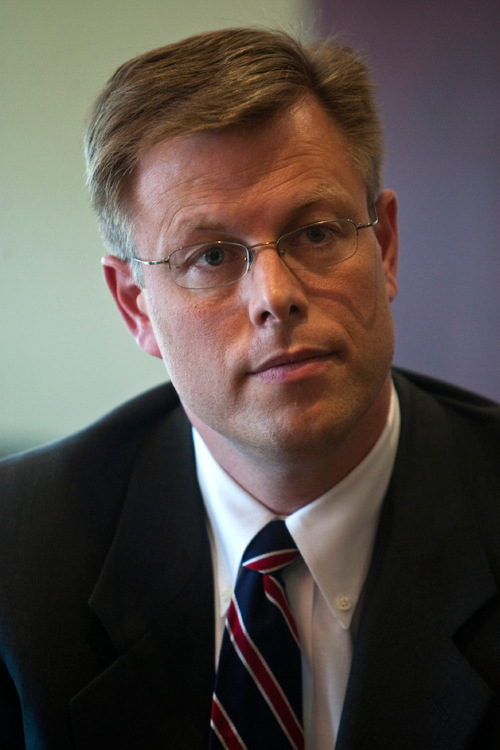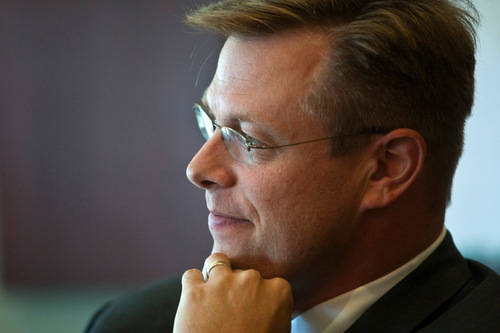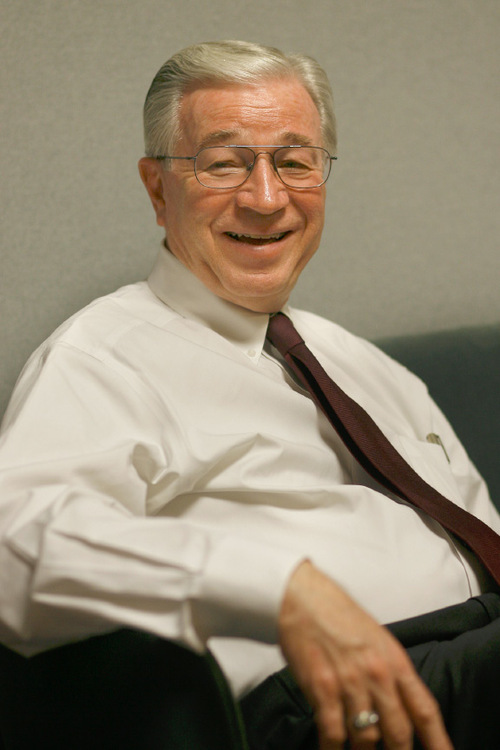This is an archived article that was published on sltrib.com in 2010, and information in the article may be outdated. It is provided only for personal research purposes and may not be reprinted.
The appearance was brief, just an hour, and the speaker blocked it out by topic in precisely timed segments.
But Clark Gilbert's presence at a Deseret News board meeting a decade ago revealed a lofty academic already light-years ahead of most print media in grasping how the Internet would disrupt newspapers' hold on consumers of news, information and ideas.
"We were debating how to get our hands around the Internet," said John Hughes, the Pulitzer Prize-winning former editor of the News.
"Somebody had heard about him and said, 'this guy seems to be a live wire ... we should try to get him in to talk to us,' " Hughes said of Gilbert, who was then a Harvard doctoral student.
With mathematical precision, Gilbert recounted the advent of the Internet and how newspapers had responded to it. Some got the Internet; most did not. Papers that didn't either ignored the new technology or insisted it pay obeisance to their old-fashioned business models, which put print first.
"He was making the point that the Internet was an entirely new concept," Hughes recalled. "So you had to put behind you the culture of the print newspaper, and you had to have people who thought and lived and breathed and died for the Web audience."
It took 10 years, but Gilbert, now 40, has worked his way into a position where, backed by the financial muscle of The Church of Jesus Christ of Latter-day Saints, he can test his theories in the real world. Last May, he became president and CEO of the News. He immediately set about developing a stem-to-stern overhaul of Utah's second-largest newspaper based both on his research and his fidelity to his church.
Last month, he was ready to go. Gilbert laid off 43 percent of the News staff and unveiled changes designed to bring the paper closer to other LDS Church media properties, many of which he also oversees as head of Deseret Digital Media, which claims to be the Intermountain West's largest online media network.
Dismaying to some, thrilling to others, most agree his moves represent a revolution in Utah media. Whether theory will pay off in practice, however, remains anyone's guess.
Gilbert, for his part, is sanguine.
"I didn't apply for this job. I'm not interested in any self-validation," he said. "I'm really just interested in doing something that matters and is great for our readers and is great for our ownership."
—
Academic credentials • Gilbert's admirers say few people know more about what the Internet has done to tear down the newspaper industry, or are prepared with ideas to put it back together.
"Through his doctoral research and his subsequent work, you'd have to say he became the expert ... on what newspapers should do to respond to the threats and the opportunities the Internet creates," said Kim Clark, who was dean of Harvard's business school while Gilbert was there.
Stephen Gray, a former Christian Science Monitor publisher who directed an American Press Institute project to test new business models, said Gilbert "understands what the industry is up against better than most people who spent their careers working for newspapers."
Regardless, some believe the new News got off to a rocky start.
An online story about an agreement between Jews and Mormons over proxy baptisms of Holocaust victims didn't indicate the author was a church spokesman. Since then, the paper has run a multipart series on the evils of pornography and turned to Catholic writers to review movies instead of its own critic, who was laid off.
LDS Church values reflected in News stories always have led some to question whether the paper's ownership was fulfilling its responsibility to report the news objectively, Utah State University professor Ted Pease said.
"But the degree to which ownership is heavy-handed, for whatever reason, in terms of what is considered news, and especially what is not considered news, then the integrity and credibility of the news product is called into question," he said.
Skeptics don't bother Gilbert.
"We will be the watchdog, but we will also bring a perspective that, unfortunately, is missing in other media outlets, and we're not embarrassed by that. We embrace it. We think we can do great journalism within that context," he said.
Nelson Wadsworth begs to differ. A devout Mormon who taught college journalism for many years, he believes Gilbert's notions about the craft will only cement the view in some quarters that the News can't be trusted to cover news professionally.
Combining the News and KSL is "platypus journalism" and the layoffs were "scary" for 85 journalists, who were cut loose at a time when few newspapers are hiring.
"A degree at Harvard Business School is not a prerequisite for calling the shots at the Deseret News," said Wadsworth, who worked for the paper for three years. "They are not journalists. They are businesspeople."
—
Defining a career • Gilbert didn't start out to study newspapers. Instead, he planned to explore how Kodak was reacting to digital photography and ways old-school Wall Street brokerage houses behaved in the face of challenges from online upstarts such as Ameritrade and E-Trade.
He planned to build on the work of Clayton Christensen, the Harvard professor who wrote The Innovator's Dilemma, a best-selling book that explored why big, successful companies almost invariably fail to cope with radical new technologies.
Established companies often fall apart due to innovation that comes in at the bottom of the market, usually in the form of a more affordable product or technology that at the outset yields meager or even zero profits, Gilbert said in an interview. They tinker with the new technology or simply cede it to upstarts until it's too late.
Digital Equipment Corp. is a classic example, he said. DEC, which had undermined IBM's mainframe computer business with its line of minicomputers, ignored the desktop. "There is no reason for any individual to have a computer in his home," DEC founder Ken Olsen famously said. The company no longer exists.
Gilbert and Christensen are close friends. "He's been a great mentor," Gilbert says of Christensen, who is still at Harvard, and like his protege, is Mormon. Both have served ecclesiastical roles for their church in Boston. Christensen is also a member of the News' new advisory board.
"He got interested in my research, and I saw in him just an extraordinary mind that could take the work that I had done and build upon it and make it much better," Christensen said.
Gilbert's research question was, if a big company gets the significance of a disruptive technology, does that help it respond differently?
For four years, Gilbert looked at eight newspaper companies in depth, including the New York Times Co. and the now-defunct Knight-Ridder Corp. He studied dozens of others.
What he learned earned him a job at Harvard Business School. It was also grist for a busy consulting sideline. And it later came to provide the theoretical motives behind the restructuring moves unfolding in Salt Lake City.
Even though newspaper executives saw the Internet coming, most could only think about the damage it would do, Gilbert said.
"The desire to defend the traditional business kept them from seizing a new business. And this was both on the product side and the business model side," he said. "Protecting the tradition caused them to miss the future."
He also found companies that tried to run new-media operations out of their traditional newspaper organizations usually weren't successful. Both their print products and their business models suffered.
The evidence, Gilbert said, was overwhelming. Newspaper websites that had significant online advertising market share had one thing in common: They all had separate digital divisions focused on the Internet. They also had separate financial reporting for their online revenue. And they developed separate web-focused sales teams who could pitch the benefits of digital advertising that could be targeted at specified customers.
The finding mirrored what Gilbert saw in other industries.
"The survival rate of [companies] overcoming a disruptive innovation is about 9 percent. But of the 9 percent that made it through, 100 percent set up a separate group to focus on the digital innovation."
—
Moving on from Harvard • Gilbert received his doctorate from Harvard in 2001. He immediately went to work as an assistant professor in the business school. Faculty who knew him as a doctoral candidate say Gilbert was a superior student on track to be a Harvard star.
"You sort of get to know students, and generally speaking, faculty pick students they want to work with," said Joseph Bower, who supervised Gilbert's doctoral thesis. "He's a remarkable guy. He's very smart, and very thoughtful."
Bower and Gilbert later went on to coauthor a book and a Harvard Business Review article with him. Both dealt with corporate strategy. So it was with regret that Bower said goodbye to Gilbert, who resigned in 2006 to take a post at Brigham Young University-Idaho as associate academic vice president of academic development in charge of online learning and distance education.
"He left to go out to follow the call [of the church]," Bower said.
Gilbert said the BYU-Idaho offer came unexpectedly in a phone call from Clark, who had left the university in 2005, when LDS President Gordon B. Hinckley asked him to take over leadership of the former junior college in eastern Idaho.
Gilbert made the decision to accept Clark's offer easily. One of his church assignments was to work with inner-city LDS students in Boston, helping them get into Brigham Young University in Provo. Most were first-generation Mormons.
Although his move perplexed his Harvard colleagues, Gilbert says his three years at BYU-Idaho were the best of his life. Clark first put him in charge of student services and activities. Later, he moved into the president's office, where he took over the school's nascent online initiatives. By the end of this year, 10,000 students will have taken an online course, five times more than when Gilbert took over the program, Clark said.
"I love the media industry, but I'd died and gone to heaven," Gilbert said. "If you want to have an impact on the world, what better opportunity is there than through education?"
His move to Deseret Digital Media in September 2009 was also unplanned. Mark Willes, the former Los Angeles Times publisher who now runs Deseret Management Corp., believed it was important to set up a unified division for deseretnews.com, deseretbooks.com and its other website properties.
Willes turned to Gilbert to run it. Like Gilbert, Willes believes the disruption the Internet has caused newspapers can be harnessed to solve their financial problems.
"What was clear to me was that we needed to set up Deseret Digital Media, and there wasn't anybody better that I know of in the country to do that," Willes said.
Now a year old, Deseret Digital is a going concern. Gilbert has staffed the company with people he calls "digital natives." The head of e-commerce formerly ran blockbuster.com. The head of sales ran software maker Omniture's western U.S. sales force. And the head of deseretnews.com ran myfamily.com.
Gilbert said Deseret Digital is setting new sales records every month and will show a profit this year.
Last May, Willes asked to Gilbert to lead the News. The move raised eyebrows. It was a new position ahead of publisher Jim Wall and editor Joe Cannon.
When Gilbert announced the shake-up of the News last month, Wall and Cannon stepped down voluntarily. By all accounts, employees who were laid off received generous severances, but they came with an admonition. Speak publicly and risk losing what for some people included a year's wages.
"We were treated very poorly," one employee said. "I could have retired, but I was not given that option. I was sort of ordered out of the building with a box of my stuff. This after quite a few years of working there."
There were misgivings outside the paper, too. Chris Lino, managing director of Salt Lake City's Pioneer Theatre Company, said he is trying to assess the impact on the acting company of the dismissal of News arts reporters who previewed and reviewed its performances.
"I've always spent the lion's share of my advertising budget in print. Well, with readership [possibly] going down, what do I do about that?" he asked.
The layoffs caused a bigger stir in Utah than elsewhere, Gilbert said. He gave interviews to national newspapers and think tanks, who were more interested in Deseret Connect, the integrated Deseret News-KSL newsroom and the advisory board, he said.
"Some of them are skeptical. Some of them are interested. It's not that everyone agrees with what we are doing. But people do see it as an effort to do something, to innovate," he said. "Look, anyone can cut costs. But you can't cut your way into a great business." —
Deseret News changes
Sweeping changes at Utah's second largest newspaper announced last month by Chief Executive Clark Gilbert include:
Layoffs • Eighty-five full and part-time workers, or 43 percent of the staff of about 200, lost their jobs.
Consolidation • Remaining staffers later this month will move to KSL at Salt Lake City's Triad Center, where they will become part of a consolidated newsroom made up of print, broadcast and Web employees.
Editorial board • An editorial board made up of "thought leaders" from throughout the country will offer advice on Deseret News coverage, with the stated goal to promote standards consistent with LDS principles.
Deseret Connect • Hundreds of freelance contributors beyond Salt Lake City and Utah will provide news and other information for publication in print and online. —
Who is Clark Gilbert?
Title • Chief executive and president of Deseret Digital Media and the Deseret News
Age • 40
Hometown • Phoenix
Education • BYU bachelor's degree, 1994; Stanford master's degree, 1995; Harvard doctorate, 2001
Experience • Harvard Business School professor, 2001-2006; BYU-Idaho associate vice president of academic development, 2006-2009; Deseret Digital CEO and president since September 2009; Deseret News CEO and president title added in May 2010
Personal • Lives in Bountiful with wife Christine and seven children







